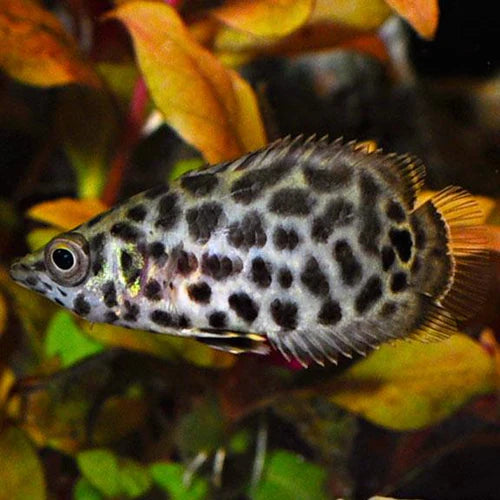1
/
of
1
Top Fin Aquatics
Leopard Ctenopoma - Spotted Climbing Gourami
Leopard Ctenopoma - Spotted Climbing Gourami
Regular price
$44.99
Regular price
Sale price
$44.99
Unit price
/
per
Tax included.
Shipping calculated at checkout.
Couldn't load pickup availability
Leopard Ctenopoma Care Guide
The Leopard Ctenopoma (Ctenopoma acutirostre), also known as the Spotted Climbing Perch, is a fascinating and colorful member of the Anabantidae family. Known for their patient, ambush-style hunting, these "climbing fish" often remain motionless among plants, waiting for prey to come within reach.
Overview
- Common Name: Leopard Ctenopoma, Spotted Climbing Perch
- Scientific Name: Ctenopoma acutirostre
- Family: Anabantidae
- Maximum Size: 15 cm (6 inches)
- Temperament: Semi-aggressive
- Diet: Carnivore
- Minimum Tank Size: 200 liters (50 gallons)
- Temperature Range: 23–26°C (73–79°F)
- pH Range: 6.5–7.5
Description & Habitat
The Leopard Ctenopoma stands out with its striking spotted pattern and ambush predator behavior. These fish thrive in well-planted tanks that replicate their natural environment:
- Tank Setup: Provide dense vegetation, roots, and driftwood for hiding spots. This setup helps mimic their native habitat and offers them security.
- Behavior: While generally calm, Leopard Ctenopomas can exhibit aggression towards smaller tank mates. They are best kept with fish of similar size and temperament.
Diet
Leopard Ctenopomas are carnivores and require a protein-rich diet:
- Staples: Live, frozen, or prepared foods like krill, ocean plankton, and small fish.
- Supplements: Floating pellet food can be included as part of their diet.
Care Notes
- Care Level: Moderate – Requires regular maintenance and a carefully managed diet.
- Compatibility: Best housed with similarly sized fish to avoid aggression. Avoid small, peaceful species that could be mistaken for prey.
Breeding
Breeding Leopard Ctenopomas is challenging and requires specific conditions:
- Spawning Behavior: These fish are bubble-nest builders.
- Water Parameters for Breeding: Slightly acidic (pH 6.5–7.0), very soft water (dH 2–4), and temperatures between 26–28°C (79–82°F).
- Raising Fry: Feed fry with live foods like baby brine shrimp for optimal growth.
Share


